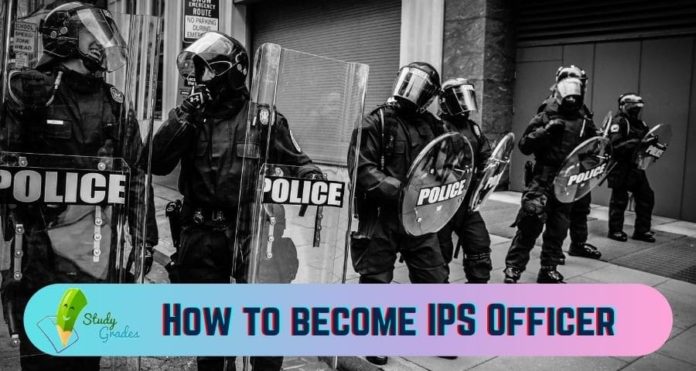How to become IPS Officer: Indian Police Service (IPS) established in 1948. To become an IPS officer is a dream of many Indians, to show their patriotism for their country. The responsibility of an IPS officer is to maintain the law and order and sovereignty of the district.
IPS officers are selected based on the candidates performance in IAS exam, conducted by the UPSC (Union Public Service Commission). The entry-level of an IPS officer designation is as a DSP (Deputy Superintendent of Police) then as an SP (Superintendent of Police), progressively IPS officers promoted to the DIG, IG, ADG (Additional DG), DG (Director General). The impressive accommodation, the official vehicle, free transport facility and handsome salaries are some of the perks to become an IPS in India.
IPS officers lead, command and monitor the State Police and Armed Police Force and an IPS officer order to follow the rules of law as well as protect the rules of the constitution. To become an IPS officer candidates must be determined into their goal. Candidates must be a citizen of India who have completed their graduation from a recognised university.
Eligibility Criteria to become IPS Officer
The journey to become an IPS officer is enthusiastic and laborious. Candidates need to pay attention to their basic skills and knowledge of society as well as education. If you are in the final year of graduation, you are eligible to apply for the post. Here we listed step by step procedures to achieve your destinations.
- UPSC
- The preliminary exam of CSE
- CSE Mains Exam
- Personal Interview
How to become an IPS Officer- Step-wise process
1st Step: Apply to UPSC
Candidates between the age of 21 to 32 years can apply for the UPSC examination. UPSC (Union Public Service Commission) supervises the National level of exam or Civil Services Exam every year for 24 services under the Central and State Government of India. The examination schedule is declared during January or February.
2nd Step: Civil Services Prelims Written Test
A preliminary exam containing two objective-type papers (General Studies Paper- l and General Studies Paper-ll). Timing of each paper consists of 2 hours. Candidates must pass the CSE prelims exam to step forward to the next level.
3rd Step: IAS Mains Written Exam
CSE Mains Exam consists of 9 papers and conducts within 7 days. It is the third step of civil services, without qualifying this exam you will not be allowed to sit the next level of the dream.
4th Step: Personal Interview
In a personal interview, some tricky questions asked by the expert. This is the last stage of the UPSC Civil Services which appoints you as an IPS officer. Presence of mind and social knowledge is necessary to make your interview easy.
IPS Officer: Physical Requirements
Being an IPS Officer, physical requirements are necessary to this highly recommended post. The following points are mentioned below.
- For the general category the minimum height for men should be 165 cm and the other category should be 160 cm.
- In the general category the minimum height for women should be 150 cm and the other category should be 145 cm.
- Eye vision must be sharp and clear, it should be 6/6 or 6/9 for better vision.
- Binocular vision is also required for the post of IPS Officer
IPS Officer: Promotions
It is a highly posted and honourable job in the internal security system of India. The duty of the IPS Officer is not specified to the state or district level, it is all about the nation to the maintenance of law and order. The following job profiles are listed below to the reference.
- Director General of Police/ Director of IB and CBI
- Director General of Police
- Inspector General of Police
- Deputy Inspector General of Police
- Senior Superintendent of Police
- Additional Superintendent of Police
- Deputy Superintendent of Police
Salary of IPS Officer
An IPS officer provided perks and an impressive salary by the government. The salary is according to the 7th pay commission which is listed below.
| IPS Ranks in State Police/Central Police Force | IPS Salary |
| Director General of Police/ Director of IB and CBI | 2-3 lakh |
| Director General of Police | 2-3 lakh |
| Inspector General of Police | 1-2 lakh |
| Deputy Inspector General of Police | 1-2 lakh |
| Senior Superintendent of Police | Approx 1 lakh |
| Additional Superintendent of Police | Approx Rs. 60,000 |
| Deputy Superintendent of Police | Approx Rs. 60,000 |
Roles & Responsibility of IPS Officer
The responsibilities of the IPS Officer is determined in several ways. Some of the listed duties are mentioned below.
- Counter-terrorism
- Railway Policing
- Economic offences
- Prevention of crime
- Proper investigation of cases
- Juvenile Offences
- Checking vandalism and negligence
- Detection of crime
- Endorsing the law of the city
- Ensuring VIP security
- Maintain law and order
- Controlling illegal activities
- To lead and maintain coordination with the CRPF (Central Armed Police Force) and examine their activities also
IPS Officer: Benefits
IPS Officer can avail the below given benefits-
- Official and personal car provided by the government
- No toll taxes during the journey
- Security Guards
- Job Security
- Pension
- Two years leave for further studies abroad
- Medical facility and leaves
Stay connected with studygrades for more careers options!






